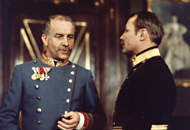We discussed the unity of Walter and Clarisse at the piano while playing Beethoven, and Clarisse's dislike of Wagner in class. Their marriage appears to function when they are together playing in ch. 17, yet they are fractured outside of that activity; she refuses to have sex with Walter as long as he plays Wagner. We discussed what a modernist like Clarisse would think of Wagner; would she object because she doesn't wish to bring the emotional strain of his music into her marriage? What other reasons could there be for her objection to Wagner? The portion of Die Walkure we viewed in class was fraught with tension; the music swelled dramatically with trouble brewing over and over.
Beethoven's Ninth Symphony was so perfect, as we discussed, that it produced a "what do we do now?" response in music. Thinking along those lines, and in response also to Clarisse's complex frustration with the marriage in ch. 38, I can see the same quandry occurring in their marriage. She asks herself "does getting on well together lead to hate?" and obsesses about Moosbrugger. Within the union of the two at the piano she seems to unravel thinking of the completeness she felt with Walter as a girl and hallucinating, it seems, about the evil of Moosbrugger.
Do you think the clash and dissonance that's heard in Wagner and later in Schoenberg are a more appropriate 'soundtrack' to marriage or modern life than Beethoven's Ninth is?



No comments:
Post a Comment